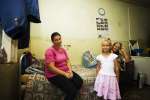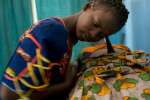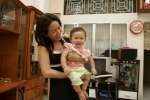- Text size
 |
|  |
|  |
| 
- Français
Argentina offers care and support to refugee women victims of violence
News Stories, 4 January 2007

BUENOS AIRES, Argentina, January 4 (UNHCR) – Born on opposite sides of the globe, Marisa* from Peru, a married mother of two boys who worked in a liquor store, and Mervat* a single maths teacher from Algeria, may not seem to have much in common.
But these two refugee women in Argentina share a painful story. Both were victims of violence – simply because they were women. In UN-speak, it's called sexual and gender-based violence. Marisa fled an abusive husband, who once hit her so hard when she was five months pregnant she lost the baby.
In Algeria, Mervat faced constant harassment by men who resented the fact she worked, sometimes insisting she wear the veil or "hijab". She almost lost an eye one day when a man threw a rock at her face as she was leaving work. The situation deteriorated to such a degree she was forced to take leave of absence from work, and barely left her house during an entire year.
Both women were unable to exercise a number of their basic human rights in their own countries, including the right to liberty and security of person, freedom from cruel or degrading treatment, the right to work and to equal protection before the law.
"The police acted indifferently as it was itself sometimes a target of the Islamic opposition groups," said Mervat. Eventually, she felt that to live in peace she had to leave Algeria. After delays in getting a visa for France, she finally fled to Argentina on the opposite side of the world.
In Peru, Marisa tried twice to escape her violent husband by heading to the capital Lima. But she was forcefully returned to her husband by acquaintances. When she could bear it no longer she decided to flee to Argentina, the most distant Spanish-speaking country in Latin America.
In Argentina, both were amongst the first women to be given refugee status based on the violence they had experienced – Marisa in 2004 and Mervat in 2005.
In a welcome move, Argentina's new refugee law, approved by Congress in November, strives to ensure that women subjected to violence receive appropriate psychological care and support. Under the new law the national refugee committee, which was already attentive to women in these situations, is charged with observing UNHCR's guidelines on protection of refugee women and sexual and gender-based violence.
These measures are part of Argentina's stepped-up response to violence against women. In Argentina, four out of every ten women suffer emotional, physical or sexual abuse, and some 6,000 claims of sexual violence are filed with the police annually. The real incidence of abuse however, is estimated to be much higher.
In Buenos Aires, where most refugees live, an observatory on gender-related violence and a unified system to address the prevention of family, domestic and sexual violence, were set up in 2006.
"Since gender-related violence is closely connected to discrimination in an array of other aspects, one common approach by the different areas of government including health, education and justice, will invariably allow us to better address underlying issues," said Beatriz Leonardi, co-ordinator of the violence against women programme in Buenos Aires.
Non-governmental organisations are also taking an integrated approach to violence against women.
Natividad Obeso, a refugee from Peru, has helped set up several associations to help refugee and immigrant women, including the first centre for refugee and migrant women subject to violence.
"The necessity for a place where women who suffered violence could address their different needs came to us after hearing their stories of pain over and over again," said Obeso.
The centre will provide legal, social and psychological assistance with the help of Argentine professionals who have offered to work on a voluntary basis. The centre founders also hope to carry out research on the issue of violence against women.
Flor Rojas, who heads the UN refugee agency in southern Latin America and co-ordinates the UN gender group, welcomes the Argentine's efforts but stresses the real challenge is prevention.
"We need to work together not only to ensure that women can resort to external help and free themselves of abusive relationships, but also to allay the frustration and anger in men which are often the driving forces behind their violent actions, as well as on the social and cultural factors which perpetuate their behaviour," she said.
"Especially in the case of refugee and migrant husbands and sons, we need to make sure that equal attention is paid to raising their self esteem, their integration and self-sufficiency. Only then, can we really aspire to eliminate this terrible scourge that is sexual and gender-based violence".
* Names changed for protection reasons
By Juan Pablo Terminiello and Nazli Zaki in Buenos Aires, Argentina





































